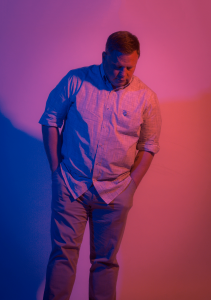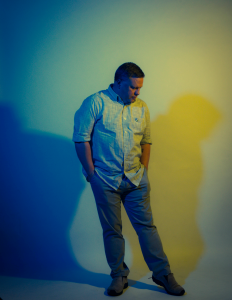
From the Winter 2019 Collegian | Over the past year, Joshua Burford’s life has been a whirlwind. After being featured in newspapers and radio shows around the country, including The New York Times, he was selected as one of NBC’s “Pride50,” a group of 50 veteran and up-and-coming activists in the LGBTQ community in the United States. But for Burford, all of this pales in comparison to expanding his life’s work: saving and creating a space for Southern queer history.
Burford started the Invisible Histories Project in 2016 and moved back to his home state of Alabama in 2018 to begin collecting. The project’s goal is to preserve the history of LGBTQ life in the South, gathering news clippings, photographs, clothing, and other types of memorabilia that represent all walks of queer life in the South. Burford knew for a long time that he wanted to create a history for his community—to give others access to the information he had wanted for so long.
The recent expansion of the project is funded in part by a $300,000 grant from the Andrew W. Mellon Foundation, which “seeks to strengthen, promote, and defend the centrality of the humanities and the arts to human flourishing and to the well-being of diverse, fair, and democratic societies.” In order to accomplish this goal, Mellon funds innovative and creative projects that are changing both culture and higher education.
While growing up in Anniston, Alabama, Burford read every book he could get his hands on. As a child, he wanted to learn everything he possibly could. But when he came out as gay in 1994, he discovered that there weren’t many, if any, publications and records about his new community available to him.
“I was doing a lot of work, talking to classmates and other people about my experiences,” Burford said. “What came up most often in these conversations was people asking what our history looked like and who came before us. When I talked to people, I had plenty of answers to questions about my own life and experiences. But I had no answers to questions about my history because I didn’t know it.”
The road that led to the Invisible Histories Project was long and filled with several other smaller archives and projects. After finishing his graduate degrees in American studies and library and information studies at UA, Burford created the Miller-Stevens Collection, which documents the beginnings of UA’s first LGBTQ group in the 1980s, and the Radical South Zine Collection, an archive of queer zines from the early 2010s. He then moved to Charlotte, North Carolina where he documented the city’s LGBTQ history. There, he decided he could create something similar in his home state and give the activists of Alabama their own space in history.
Since 2016, Invisible Histories has gathered nearly 40 collections from every corner of the state. Burford, his co-director Maigen Sullivan, and their staff have sifted through dozens of boxes of photos, letters, scrapbooks, newspapers, protest signs, banners, flags, and even board games and quilts, piecing together different people’s lives to create a long and rich narrative of the queer South.

“It’s not a small thing to ask someone to turn over their life history to you,” Burford said. “But a lot of people have been holding on to this material in the hope that someone would want it. A lot of people we talk to spent years clipping articles out of newspapers about anything that was LGBT, and putting them in a folder.
“They were so hungry for information about the community because they weren’t getting it. And to me, that shows very clearly that they were thinking about the future. What we’re doing is we’re giving them a place to put this material that they spent years curating—we’re giving it a place to live.”
Along the way, Burford and his team have found artifacts and objects that don’t exist anywhere else, including newsletters from an early transgender activist group and planning documents for the first National March on Washington for Lesbian and Gay Rights in 1979. Access to this kind of material is important and exciting for Burford because it not only shares a piece of history with someone searching for answers, but it shows others the long, rich history of the queer community in the South.
“I’m doing this because there are these amazing queer activists who have always been here,” Burford said. “There are people who have been doing this work for a really long time who deserve to have their voices raised. They deserve that. And I have a platform that allows me to preserve and to elevate these people’s voices.”
Burford hopes that the archives can help establish the legacy of the queer South, but also be a platform for groups within the community that face more marginalization than others, such as transgender women of color and queer young people. If he can help shape a future that is more inclusive, he says, he will have made his community even better than it was before.
“In a community that already feels marginalized, there are still people who are more marginalized than others,” Burford said. “If we can put those voices back at the table, what kind of future can we imagine for ourselves?”
Over the next few months, Burford and his team will be travelling to Georgia and Mississippi to start archiving efforts, as well as collecting more materials from cities in Alabama. The project hopes to expand its repositories in Birmingham and Montgomery, and establish more throughout the state. They also will be educating graduate student fellows interested in archiving LGBTQ history by giving them hands-on experience with their materials and showing them proper techniques for archival standards and digitization.
While the Invisible Histories Project continues to expand across the South, Burford hopes to encourage the LGBTQ community in the South and all over the country to find the resources they need to live the life they want. From those new to the community to those who have been involved for years, Burford wants all LGBTQ-identifying people to advocate for themselves and those around them.
“Take up more space,” Burford said. “We spend so much time trying to fit in that we forget to advocate for ourselves. If you think you need something, ask for it, because someone else probably does, too.”
Visit the Archives:
Birmingham Public Library Archives: 2100 Park Place, Birmingham, AL | Monday-Friday: 9 am-6 pm
University of Alabama at Birmingham Archives: 1700 University Blvd, Birmingham, AL | Monday-Friday: 8 am-4:30 pm
Alabama State Archives in Montgomery: 624 Washington Avenue, Montgomery, AL | Monday-Saturday: 8:30 am-4:30 pm